Have you thought about how you’re going to power your next campaign project? Despite what you might think, power doesn’t run off of an idling engine or internal battery and you can’t just plug everything in and hope for the best.
Venues have strict regulations and power facilities are highly variable. A generator might be fine at one site and be banned at another. This is why you must always ask the right questions well ahead of time, and plan accordingly.
In this article you’ll learn what questions to ask your venue, what influences power requirements and how we can help you.
How is electricity measured?
There are several questions you should be asking, but first we need to start with a little basic education, electricity can be confusing.
Electricity is measured in a variety of units including volt, amps, ohm and watts. A good analogy to ease understanding is to compare electric circuits to water in a plumbing system.
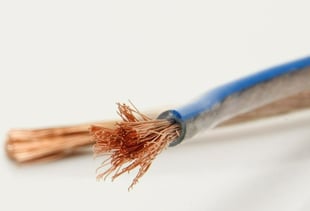
- Voltage (volts/V) is equivalent to water pressure.
- Ohms (R) is a measurement of resistance.
- Amperes (Amps/I) is a measurement of current speed. This is calculated by dividing the voltage by the resistance (volts ÷ ohms).
- Wattage (Watts/W) is a measurement of overall power. This is calculated by multiplying the voltage by the current (volts x amps). A kilowatt (kW) is 1000 watts.
So the higher the voltage, the faster the current, in the same way that the more water you run through a pipe, the more water that comes out the other side.
The wider the pipe, the lower the resistance - just think of how a tap works, the further you turn it, the more water that can come out.
How does this apply to a socket?
So, an average 32amp socket runs 230V, if we multiply 230 by 32, we get the power output: 7,360W or 7.3kW, meaning appliances that use up to 7.3 kw of power can be used with this socket.
How much electrical power do appliances use?
Check out our table below to see how much electricity common appliance use on average. You can use this table to build an energy budget into your power requirements.
| Appliance | Power (Watts/W) |
| Mobile Phone Charger | 12 |
| Microwave | 600-1,000 |
| Fridge/Freezer | 150-250 |
| Counter Top Fryer | 3,000 |
| Double Fryer | 6,000 |
| Coffee Machine | 1,500-2,500 |
| Ice Cream Machine | 2,500 |
| Lighting | 100 |
| Oven | 3,000 |
| Double Oven | 6,000 |
| Flat Griddle | 3,000 |
| Water Heater | 2,000 |
| Water Urn/Kettle | 2,000 |
What are my power source options?
There are several ways you might power your appliances at a venue event. An appropriate power source largely depends on your requirements and campaign goals.
Venue outlets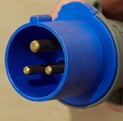
Outlets are just the electrical sockets provided by your venue. These provide between 16 and 32 amps on average, but occasionally venues have 63 or even higher amp options available. Electrical sockets come in single and 3 phase, which essentially means 3 sockets in one. You can think of single as a regular socket and 3 phase as a triple.
On the right above you can see a blue single phase plug, on the left below a red 3 phase.
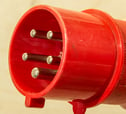 A 32 amp single phase socket is normally limited to 7.3kw of power, a 3 phase would have the same limit for each of its 3 wires. The wires are then split to three sperate sockets with a splitter box, they can’t be combined for more power.
A 32 amp single phase socket is normally limited to 7.3kw of power, a 3 phase would have the same limit for each of its 3 wires. The wires are then split to three sperate sockets with a splitter box, they can’t be combined for more power.
Generator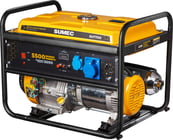
Generators are useful when you have exorbitant power requirements and no power support from your venue. Keep in mind that the greater your power requirements the larger and louder your generator will be.
Gas
A great outdoor option to keep costs down on a cooking rig, gas is ideal for food trucks. This option is not suitable for indoor venues if they aren’t appropriately ventilated.
Battery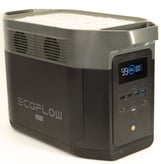
Batteries are a greener and quieter alternative to a generator and can be easily charged overnight from a regular 230v wall socket – very handy if you’re staying in hotels on an extended campaign! We source high quality long lasting lithium batteries, ideal for running a bar setup, with fridges, microwaves etc.
We can currently run ice cream machines on battery power alone. The batteries have their limits though, if you are planning on cooking you will want one of the above options.
Solar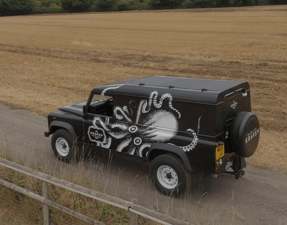
This works perfectly in concert with our lithium batteries if you are going for a green setup. Our solar installations will recharge your batteries during the day, meaning you use less non-renewable energy to charge them.
This option is particularly useful in summer, when solar intensity and duration peaks, making a substantial difference to your power usage.
Is there anything power wise Promohire can’t do?
Not really, power wise we can do pretty much anything. From fairly low energy bar or sampling setups we scale all the way up to fully outfitted catering setups, with multiple fridges, ovens and fryers.
The real limit is how much we can pack into a vehicle efficiently and safely, but much of that comes down to the size of vehicle you select. If you have a design that will be particularly complex to setup and maintain, we may send an electrician with you for an extra fee. This usually costs about £400 per activation (event) day.
The ultimate hurdle though is what your venue will allow, which is why you must ask questions before you settle on a location and vehicle setup.
What power questions should I be asking venues?
Finally on to those all important questions! Now that you know a little about electrical terminology and power options you’ll know what to look for when talking to your venue.
-
What power facilities do you provide?
This is an important question to ask off the bat. You need to know how much the venue is able to help power your appliances. Asking for a floorplan with power inlets highlighted is a good place to start.
Many venues will provide a single or even multiple sockets, but you have to nail down the specifics – and this is where your newly acquired electrical knowledge comes in.
If there are sockets, you need to ask how much power they output and how many you will have access to. For example, energy intensive appliances such as a fryer can use up to 6-7 kilowatts of power, the same power output as the average single phase 32 amp socket.
That means your entire electricity supply would be used up running just one appliance! If you only have access to a 16 amp socket you wouldn’t even be able to run it.
Venues have power safety regulations too, so they won’t let you overload a single socket in order to plug everything in. If your venue has a 3 phase plug we can plug in a splitter box, allowing us to regulate your electrical requirements safely and efficiently.
If you don’t have the luxury of 3 phase power, then it’s time to start thinking plan B.
-
Can I use my own power supply?
Most venues will be ok with this, under the strict proviso that you follow all their health and safety requirements to the letter. Generally there is less paperwork and restrictions when you use a venues own power supply.
If they say no, and you desperately needed more power than they supply, it might be time to reconsider either the venue or your design. Some venues may also require you to use their power supply, which will put a hard cap on how much total power you can use.
If they say yes, it’s time to quantify what is and what is not allowed.
-
What forms of external power can I use?
Make sure you dig into the details on this one. Many forms of external power are likely to be allowed, but they will likely come with restrictions. Let’s use some common issues we run into as examples.
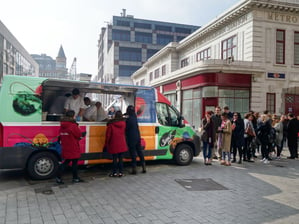
Generators
Generators are unlikely to be a problem at most outdoor venues, but if you have extensive power requirements you need to be mindful of noise restrictions that a larger generator might breach.
There could also be restrictions on the type of fuel used by the generator, you may find diesel generators are banned in favour of petrol for example.
Lithium batteries
Lithium batteries are a relatively novel power source for venues, so it’s important to ask specifically what a venues stance on them is and whether you might need any special paperwork.
Sometimes a product can be so new that regulations haven’t been formulated for it yet, so it’s always best to ask politely, especially if it comes down to a matter of personal discretion.
Gas
Indoor venues may have health and safety concerns that rule out the use of gas as a power source in close quarters. Outdoors should be absolutely fine though.
Cover all your bases
Make sure you probe for details, limits and requirements for all forms of power the first time you contact your venue. If it turns out you can’t use what you wanted, you don’t want to waste time asking the same questions about a different power source.
-
What health and safety requirements do you have?
Health and safety, health and safety, health and safety! Get used to hearing this a lot, because everything at a venue has to comply with health and safety regulations.
 Just imagine multiple uniquely modified vehicles potentially crowded together in an enclosed space… there is a lot that could go wrong if not managed correctly. For this reason you must ask what health and safety requirements are in place for power.
Just imagine multiple uniquely modified vehicles potentially crowded together in an enclosed space… there is a lot that could go wrong if not managed correctly. For this reason you must ask what health and safety requirements are in place for power.
Feeding this information back to us means we can design a suitable setup from the beginning, without any last minute panic on event day. Last minute modifications can cost as much as £2000 in some cases, as we have to retrofit your vehicle, an extremely expensive mistake to make. Don’t be caught out, ask upfront!
RAMS
RAMS or Risk Assessment Method Statement, is one of the ways venues monitor health and safety standards. Venues will almost always ask for RAMS documents –documents that identify the steps taken to minimise hazards or risk when carrying out a task.
This is something we take care of for you, completing RAMS when and where necessary as part of our logistical services. However, we do need to know what regulations are in place in a venue so that we can comply with them in our RAMS documents.
Most venues will disclose documents detailing their requirements to you, which you can forward on to us as necessary.
-
How much does it cost to use your power supply?
Quite often venues will charge for the use of their on-site power. It’s useful to tell us upfront what they are going to charge for this, as we may be able to reduce or cut your dependency on their sockets altogether through one of our power support options.
Just one lithium battery for example, can run a low energy bar setup for an entire working day.
What are my next steps?
Now that you’ve wrapped your head around power, you can take these 5 questions to your venue with confidence.
You likely have a plan for all these appliances, but if you haven’t thought about your design in detail yet, head on over to promotional vehicle design 101 to help you get started.
How much will it cost to make this design a reality? Take a look at our budget calculator and costs and services explained article, for a breakdown of all the factors that can influence the price of your promotional project.



